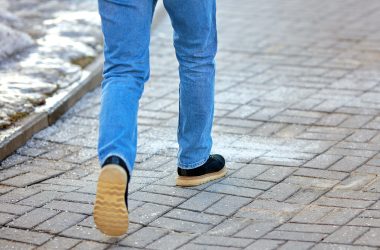Can Your Shoes Affect a Slip and Fall Claim?
Can Your Shoes Affect a Slip and Fall Claim?
October 22, 2025
Many slip and fall victims worry that their choice of footwear might destroy their case. This concern is understandable—after all, insurance companies often point fingers at everything except the dangerous conditions that actually caused the fall.
At Lafferty, Gallagher & Scott, LLC, our attorneys have been helping slip and fall victims since 1973. Yes, shoes sometimes matter, but they’re usually just one piece of a much larger puzzle. Your footwear will generally only affect your claim significantly when:
- You wore completely inappropriate shoes for the known conditions (like flip-flops on icy steps)
- Your shoes were so worn that they had no tread left whatsoever
- You deliberately chose dangerous footwear despite obvious hazards
- The property owner can prove that your shoes were the primary cause of the fall
There are so many critical aspects that come into play in slip and fall accidents. Let’s look closer at why your footwear is rarely the deal breaker.
Why Is the Insurance Company Blaming My Shoes for My Slip and Fall?
Insurance companies routinely search for ways to shift blame away from their insured property owners. Footwear criticism serves as a convenient scapegoat, even when wet floors, broken steps, or poor lighting created the real danger. They’ll scrutinize everything from your heel height to your sole material, hoping to reduce their payout.
Don’t let their tactics fool you. Just because they mention your shoes doesn’t mean this argument will hold up in court or significantly damage your case.
Are Certain Shoes Considered Unsafe in a Slip and Fall Case?
Some footwear types face more criticism than others. High heels, flip-flops, worn-out soles, and dress shoes with slick leather bottoms often draw negative attention from insurance adjusters and defense attorneys.
However, these shoes don’t automatically eliminate the property owner’s responsibility to maintain safe conditions. Courts recognize that people wear different shoes for different occasions—you shouldn’t need industrial-grade footwear to walk safely through a grocery store or office building.
Could Worn-Out or Inappropriate Shoes Reduce My Compensation?
Possibly, yes. Ohio follows comparative negligence laws, meaning your percentage of fault can reduce (but not eliminate) your compensation. If the court determines you contributed to the accident through poor footwear choices, your award might decrease accordingly.
Courts consider multiple factors when assigning fault: the hazard’s location, available lighting, warning signs, property maintenance records, and weather conditions. Footwear is just one element among many. Even if your shoes played a minor role, you can still recover substantial compensation when the property owner bears primary responsibility.
What Should I Do if My Slip and Fall Is Partly Blamed on My Shoes?
Take these protective steps immediately:
- Preserve your shoes—don’t discard them, as they may serve as crucial evidence
- Document everything—photograph the accident scene, your injuries, and the hazardous condition
- Gather witness information—collect contact details from anyone who saw the incident
- Avoid admitting fault—don’t apologize or discuss shoe choices with property owners or insurance adjusters
- Contact legal help—an attorney can build strong defenses against unfair blame tactics
Remember, insurance companies use these strategies to minimize payouts. Having legal representation levels the playing field and protects your rights.
Shoes May Be a Factor, But They’re Not the Whole Case
Property conditions almost always matter more than shoe selection in slip and fall cases. Dangerous floors, inadequate maintenance, poor lighting, and missing warning signs create the real hazards that cause injuries. Don’t let concerns about your footwear prevent you from pursuing the justice and compensation you deserve.
The experienced attorneys at Lafferty, Gallagher & Scott, LLC understand how to counter insurance company blame tactics. We’ll thoroughly investigate the property conditions, gather evidence, and fight for your full compensation. Contact us today for a free consultation—your shoes won’t stop us from protecting your rights and maximizing your recovery.
TESTIMONIALS





